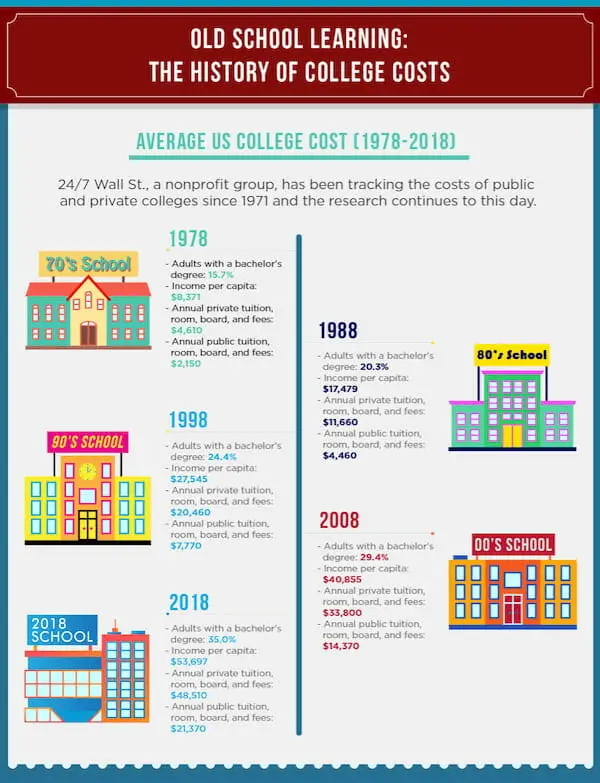If it costs money, then it has a break even point. In college’s case, it is the point where the cost of tuition meets the potential income you can gain from the knowledge you are learning. We hear all the time about the cost of tuition rising, and in some cases students are rioting in the streets.
There Are Many People with Bachelors Degrees and PhDs Bussing Tables in Restaurants.
I meet people everyday with a bachelor’s degree who are wiping tables, or answering phones in a call center. Heck, there are adjunct professors, with PhDs, who’ve been teaching for 15 years, some of whom sleep in their cars. Many people will say that these people lack motivation. I run into far too many that I wonder if there is more to it. I’m not trying to disparage a college education, but is it beginning to approach a point of saturation?
Is There an Oversupply of Qualified Job Candidates? Are Schools Turning Out too Many Graduates?
Are there so many students getting degrees that the demand has flung tuition prices sky-high and this is the invisible hand adjusting things? At what price is a liberal arts, or communications bachelor degree too expensive? Some people say that you can’t place a price on education, but tell that to the students who were rioting in London.
Is a College Degree for Everyone Really the Right Policy?
Even President Obama said that he wants everyone to go to college. That could just be overly optimistic political-speak, but if that did come true, then college degrees would be about as useful as high school diplomas; save for the fact that college degrees are at least specialized.
Are We Pressuring the Next Generation Into College? Did We Misplace These Good Intentions?
There is such a large social pressure on college, especially for 1st generation college students in minority families. If the degree won’t pay you back, is it worth it?
Obviously, that question is subjective. It seems like the market is so saturated with students that even for-profit, publicly traded colleges are entering the market. With so many degree holding job-seekers out there, will a degree become meaningless? Is it possible that college may become self-defeating?
Overview: The Increase of College Tuition Throughout The Years (Infographic)
Since baby boomers’ were in college, the prices of tuition have doubled in size and while many factors are at play for this astronomical increase in cost, the reasons don’t matter for college applicants. Today, we will focus on diving further into the increase itself, when it started, and how much has changed over the years.
The average college tuition was once a modest and decent price. Once the baby boomers started going to college, the average annual tuition started to increase. For example, back in 1971, the annual tuition cost of a public university was around $500, while for private universities it was around $1,832. Fast forward to the year 2016, if we make a comparison we can clearly see that a lot has changed.
The average college tuition today including all four years plus additional fees costs around $104,480. A single year at a public university has been estimated to cost around $22,432. As a result of the currently astronomical prices, student loans became the biggest part of the U.S. non-housing debt and loan program.
Now that you are familiar with the basics, it’s time to get to the numbers. Below is a snippet of an infographic that highlights some of the stunning changes in the costs of tuition:

Do Colleges Make Excellent Thinkers, Excellent Employees, or Extraordinarily Compliant Employees?
I’ve heard the joke many times before that “colleges create good employees.” Sometimes I wonder if that is the case. I meet many people who are completely brilliant but have little more than a high school diploma. I also have met quite a few college graduates, some with advanced degrees, that… the rest can be left unsaid.
Perhaps the saying should be “colleges create very compliant employees.” I mean, after all, if all of your employees are quivering in their cubicles reciting the famous mantra (which I heard numerous times while I worked for large corporations)…
We’re lucky to have a job.
Pretty Much Every Corporate Employee on Earth
… then you can probably rest assured that they’ll comply with any inane policy put forth. They’ll jump through any hoops to keep their job. After a round of lay-offs, instead of being angry at the company, they’ll quiver inside their cubicles and think…
I’m so lucky they didn’t lay me off.
Best of all, for the company at least, is that it drives the cost of labor down. In many of the STEM fields, the surplus of students drives down the cost of labor. Please don’t confuse what I’m saying here: STEM jobs pay more on average, but because of the surplus in many fields (or lack of demand), the expected pay is less.
Is College the Solution for Income Generation and the Wealth Gap?
People will cite:
- Bill Gates (Microsoft)
- Warren Buffett (eventually, he went back)
- Steve Ballmer (Microsoft)
- Richard Branson (Virgin Companies)
- Michael Dell (Dell Computers)
- and Steve Jobs (Apple Inc)
When they talk about college being unnecessary, but do they have a point? It’s easy to cherry-pick data. Yes, there are numerous, successful dropouts, but there are even more failed dropouts. The hard thing to quantify is how much more successful graduates could have been if they had pursued a passion. Additionally, the variables have changed.
The College Economic Variables Have Changed: More graduates than ever with more debt than ever.
What is also missing from the data is that we’ve embarked on a new experiment: we’ve never had so many college graduates vying for jobs, and they’ve never had so much debt. So, when we examine decades old earnings data and statistics, they largely may be irrelevant given the new variables we face.
College is a solution, but not the solution. We can’t refute the data: generally speaking, college graduates do better financially than non-college graduates. College absolutely gives people a financial leg up (assuming they can control the debt-load). But we miss out on the role passion can play in productivity. Instead, we allow shame, peer-pressure, and expectations of others drive the future decisions of today’s youth.
I think many people languish because we push them into college when their passions could have been used elsewhere, even in the trades. We will probably never be able to calculate the economic, and societal harm this causes- that’s the most disappointing part.
How Do We Understand the Benefit or the Harm of Over-Supplying College Graduates?
By forcing kids into college and degrees, when they otherwise would’ve been more productive in society as a tradesmen, or in a less prestigious academic undertaking where they are passionate, we likely harm society as a whole. We also harm passionate job-seekers in that field who must compete with this artificially increased competition, while also lowering the quality of life for the graduate who is only chasing the pay-check their parent’s dreamed for them.
The main benefit is we lower labor costs. But, we can’t calculate what we lose when the passionate person misses out on the job to a lower-cost, less passionate worker. How different the world would be had Albert Einstein locked away his talents inside of a major accounting firm.
We don’t even know what advances in technology, food production or space exploration are lost due to talented people laboring in areas they don’t care for. Often, they labor in these fields only because the pay is good, or because they come from generations of attorneys- so naturally, they must be an attorney.
What Do You Think, and What Can You Do to Help?
I don’t have the answers to all these questions, but I’m curious to hear what your thoughts are on this. Is college pricing itself out of the market due to demand? Should there be as many college graduates as there are? What can we do to help ensure the most passionate people are entering the fields they can devote their lives to?
Do you believe with the current number of students in attendance, that colleges can still devote enough time to properly educate and hone the experts and leaders of tomorrow, or are they just churning out the same person that went in, just with a different stamp on their paper? Should we set aside peer-pressure, parental pressure, and societal expectations to help people make the best decisions possible for themselves?
